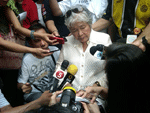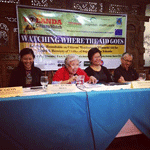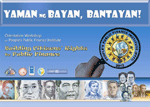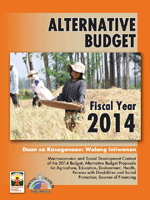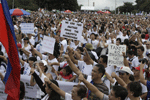Philippines
Published on Sat, 2013-12-14 23:00
In the last month or so, the Philippines has received overwhelming sympathy and support from the rest of the world. These are through kind words, prayers and donations meant for the survivors of super typhoon Yolanda. The numbers are online, the Budget Department says. Anybody can easily go to www.faith.gov.ph—the Foreign Aid Transparency Hub. Aggregate amounts are posted on the right side of the site, broken down into cash and non-cash donations. |
Published on Thu, 2013-12-05 23:11
Three days into the first month since super Typhoon Yolanda flattened many parts of central Philippines, media groups, netizens, and disaster risk reduction advocates come together to talk on steps to ensure that the funds and goods donated for Yolanda victims will be accounted for and will match of the needs of about 11 million people it affected. More than tracking where foreign aid goes as the country continues to recover from Typhoon Yolanda (Haiyan), citizens need to keep an eye on how government’s calamity funds are spent, Dr. Leonor Briones, lead convenor of Social Watch Philippines advised civil society organizations on December 4th. |
Published on Thu, 2013-10-31 13:05
Social Watch Philippines (SWP), Silliman University in Negros Oriental and Mindanao State University (MSU) in the Autonomous Region of Muslim Mindanao (ARMM) launched the People’s Public Finance Institute (PPFI), which is the first-ever center on teaching citizens to learn and be actively involved in public finance in the Philippines. “As part of Social Watch Philippines’ commitment to asserting social development for people’s rights and empowerment, we are setting up PPFI centers in various State Colleges and Universities (SUCs) all over the country,” said former national treasurer and SWP lead convenor Leonor Magtolis Briones.“Through the Institute, SWP and SUCs will educate the general public, civil society organizations (CSOs) and interested local government officials on national and local public finance working under the framework of citizens’ participation,” she added. |
Published on Thu, 2013-10-17 14:44
In the Philippines, Social Watch Philippines monitors the MDG programs as implemented by the government. Its main advocacy is more government spending for health, education, agriculture, the environment, and for social protection for all. It has organized the Alternative Budget Initiative (ABI) which proposes alternative budgets for these MDG-related expenditures. |
| Published on Sun, 2013-09-15 00:00 |
Published on Fri, 2013-09-13 22:48
“The abolition of the pork barrel system should be total” said Leonor Briones, lead convenor Social Watch Philippines, to a Congressional committee in Manila, bringing to legislators the message that hundreds of thousands of people had reaffirmed in the streets during marches against corruption in the previous days. “Pork barrel” is the popular name of a system that allows members of parliament the direct allocation of budget funds to pet projects in their constituencies. Some “pork barrel amount to the equivalent of four million dollars a year. The president himself manages a “pork barrel fund” of some 500 million dollars and several items of the Special Purpose Funds (SPF) in the national budget for 2014. “SPFs breed corruption. How can Congress scrutinize the SPF when there is no detail? It is just one chart in the budget documents and one line in the summary papers,” SWP said Briones. |
| Source: . Published on Fri, 2013-09-13 00:00 |
| Source: . Published on Wed, 2013-09-11 00:00 |
| Source: . Published on Tue, 2013-08-27 00:00 |
Published on Thu, 2013-08-22 00:00
"Citizen monitoring and accountability of governments, corporations and international institutions are essential for a new development agenda to succeed". Roberto Bissio, Coordinator of Social Watch, shares his reflections on the Social Watch Philippines' National Consultation on the High Level Report on the Post 2015 Agenda. |

